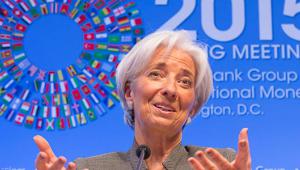In a chapter of its biannual World Economic Outlook, released ahead of the fund’s annual meetings in October, the fund said that popular support for globalisation needed to be sustained. Otherwise, spreading protectionism could weigh heavily on trade growth, which was already at historically low levels.
The OECD also warned last week that global trade growth had slowed to unprecedented levels. It is now at around half the rate seen before the global financial crisis, and below the rate of global GDP growth, when in the past it had been double that.
The fund said this was largely tied to the general slowdown in the global economy, with advanced nations stuck in sluggish rates and many key emerging markets in recession. The related fall in investment was seen as they key factor, the fund said.
But it warned that moves towards protectionism – increased barriers to trade and global integration – were “not innocuous”.
“While the quantitative contribution of trade policies to the slowdown in trade growth has been limited so far, protectionist measures could significantly weigh on global trade if they become more widespread,” it warned.
With other factors already pushing growth in trade down, it said resisting all measures of protectionism and reviving the process of trade liberalisation by removing barriers would provide “much-needed support”.
However, in order to do so, it noted that popular support for globalisation would need to be sustained. Policymakers should ensure those affected negatively by further integration are protected and can accrue advantages from it.
While globalisation has led to an overall rise in living standards, not all have benefited equally. Workers around the world, for example, in the US and Europe, have lost their livelihoods as industries move abroad to cheap labour, or cheap labour comes to them.
The backlash can be seen in the UK’s Brexit vote and the rise of populist figures like US presidential candidate Donald Trump, whereby anti-immigration and protectionist narratives have resonated with voters feeling left behind as globalisation marches forwards.
“An increasingly popular narrative that sees the benefits of globalisation and trade accrue only to a fortunate few is gaining traction,” the IMF noted. “Policymakers need to address the concerns of trade-affected workers... to mitigate the downsides of further trade integration for the trade agenda to revive.”
This should include effective support for re-training, skill-building and occupational and geographic mobility, the IMF suggested.
The fund also released two other chapters from its World Economic Outlook, which is widely expected to cut forecasts for global growth again when it is released.
One of the chapters warned of increasing global economic contagion, where events in one nation’s economy have a knock-on effect for other markets. The fund said that while this was once limited, in the main, to events in advanced economies, the growing clout of emerging markets meant they too were now a significant source of spillover.
China’s effort to rebalance its economy away from industry and toward consumption has had a significant impact on the rest of the world, for example. The fund also highlighted that non-economic developments, such as rising migration triggered by people fleeing conflict, are also playing an increasingly important role.
But the fund stressed that despite the negative short-term impact on economies these developments can have, they offer potential gains in the long term if handled well. For example, increased migration can meet the challenges stemming from ageing populations.
Another chapter looked at globally low inflation, and warned that the ability of monetary policy to combat stubbornly low rates appears to be diminishing.














